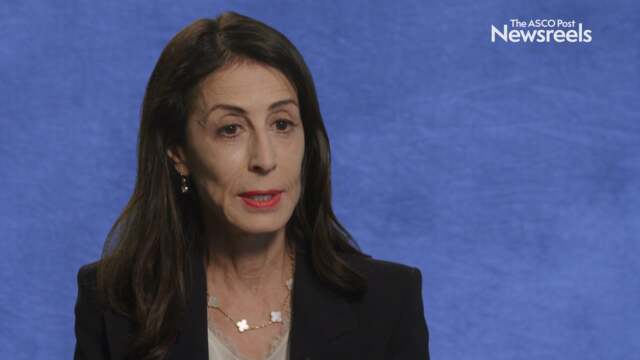Caroline Robert, MD, PhD, on Advanced Melanoma: Research Highlights
ESMO 2018 Congress
Caroline Robert, MD, PhD, of Gustave Roussy Cancer Centre, discusses two high-impact studies in stage III melanoma treatment: an update of the COMBI-AD trial examining dabrafenib and trametinib; and neoadjuvant ipilimumab and nivolumab therapy.
Eileen M. O’Reilly, MD, of Memorial Sloan Kettering Cancer Center, discusses the latest information on locoregional and systemic treatments of hepatocellular carcinoma as well as targeted therapy for biliary cancer.
Cora N. Sternberg, MD, of San Camillo-Forlanini Hospital and the Israel Englander Institute of Precision Medicine at Weill Cornell, discusses results from the phase III CheckMate-025 study on nivolumab vs everolimus for mRCC; the CheckMate-214 study on nivolumab, ipilimumab, and sunitinib for treatment-naive advanced or metastatic clear-cell RCC; and immunotherapy for urothelial cancer for both first- line cisplatin-ineligible and second-line therapy after cisplatin chemotherapy.
Karl Lewis, MD, of the University of Colorado, discusses a phase II study of cemiplimab in patients with advanced basal cell carcinoma who experienced progression of disease on, or were intolerant of, prior hedgehog pathway inhibitor therapy.
For more information about this ongoing trial, visit clinicaltrials.gov
ClinicalTrials.gov ID: NCT03132636
Lisa A. Carey, MD, of the University of North Carolina, and Sherene Loi, MD, PhD, of the Peter MacCallum Cancer Centre, discuss the phase III IMpassion 130 trial testing the first-line combination of the PD-L1 inhibitor atezolizumab plus nab-paclitaxel in metastatic triple-negative breast cancer (Abstract LBA1_PR).
Suresh S. Ramalingam, MD, of the Emory University School of Medicine, summarizes the top-line lung cancer results reported at this year’s ESMO Congress, including the role of targeted treatment for early stage NSCLC, combining immunotherapy for surgically resectable disease, and immunotherapy for small–cell lung cancer as well as unresectable NSCLC.





